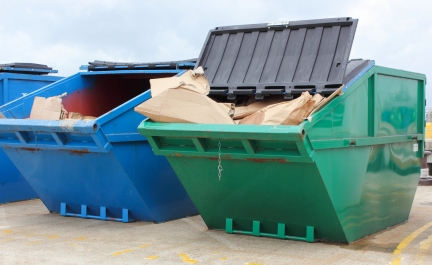
Recycling is good for Minnesota's economy. It supports more than 60,000 jobs in our state, paying almost $3.4 billion in wages and adds nearly $15.7 billion to Minnesota's economy.
Minnesotans are still throwing away more than 850,000 tons of recyclables each year with an estimated value of $153 million. No matter where you live or what you do, there are things you can do to increase and improve recycling.
Property owners with buildings in the seven-county metro area that contract for four cubic yards or more of trash per week must recycle at least three materials.
For everyone else, follow these steps to start or enhance recycling in your organization.
Know your waste
The first step to recycling is knowing what you are throwing away. What volume and types of materials are you throwing in the trash, and what could be recycled? To answer that, you need to do a waste sort or waste assessment. Learn how:
Know your hauler
Your waste hauler can be a great partner in increasing your recycling and saving money.
Ask your waste hauler:
- What types of recyclables do you pick up?
- How should recyclables be sorted?
- Is there a minimum amount required for pick up?
- Do you provide bins or dumpsters?
- How is the pick-up service scheduled (weekly or on-call)?
- Can you weigh or measure my trash and recyclables?
- What are your payment terms? Are they flexible to accommodate variable waste and recycling amounts, or is it a flat fee?
- Do you require a contract for service? How often is it renewed?
- Can you provide references?
If your hauling contract is up for renewal, consider requesting competitive bids from other local haulers.
If you have less recycling than a hauler will pick up, several counties operate drop-off centers. Or consider working with a nearby business to share a hauler.
Successful recycling
Building owners: If your tenants generate similar recyclables, a centralized collection area in a trash room or loading dock is an effective way to provide recycling for all tenants. Provide flexible recycling options to accommodate the needs of your tenants.
Tenants: Work with your building owner to develop a recycling program that works for all or most of the tenants. Be willing to seek out separate recycling services for unique or business-specific materials such as plastic wrap, plastic strapping, textiles, or wood pallets.
Bins
- Put recycling bins next to every trash bin and make them visible
- Use clear, consistent bin colors. Blue bins are always recyclables. Green bins are always organics.
- Some counties offer funding assistance to purchase bins and labels.
Signs and labels
Using consistent labels and bins will increase participation and reduce misdirected waste.
- Use clear, consistent signs and labels that include photos of your most common wastes.
- See the Recycling resources page for printable bin labels
Outdoor bins and enclosures
- Contact your hauler to find the right size and type of enclosures to accommodate recycling bins. Haulers often provide space planning guides on their websites.
- Keep in mind that you aren’t making more waste, you’re just sorting it differently. You might have a few small dumpsters instead of one large one, and they might fit in the enclosure you have now.
- You may need to request a variance from your city if you need to make your enclosure bigger. Plan enough space for future increases in your recycling or organics collection.
Training and commitment
- If you have a janitorial service, include them as you plan and implement recycling. Get them on board early and work together to make adjustments over time.
- Employee and tenant participation and training are crucial to the success of a commercial recycling program. Talk with employees and tenants about your recycling program and get them on board.
- Highlight how the recycling program can save money and tie into company values. Make it easy for employees and tenants to figure out what is recyclable. Track progress and use this information to motivate employees and tenants.
Saving money
- Recyclables are tax exempt. Recycle more and pay less in taxes. State and local solid waste taxes are only applied to trash.
- Target high volume recyclable materials in your building to maximize your savings.
- Keeping recyclables out of the trash may mean you can reduce the amount or frequency of trash collection. Contact your hauler to discuss “right-sizing” your service and see what you might save on your monthly bill.
- If your hauling contract is up for renewal, consider requesting competitive bids from other local haulers.
- Some counties have grant funding to help you pay for bins, signage, staff training, subsidized hauler services, equipment, and more. In greater Minnesota, members of the Minnesota Chamber of Commerce can contact Minnesota Waste Wise for free assistance and grants.
Resources
- Video: Recycling at your business (5 min.)
- Minnesota Technical Assistance Program (MnTAP) helps Minnesota businesses reduce waste and prevent pollution
- Minnesota Materials Exchange connects businesses that have reusable goods to those who can use them
- Minnesota Waste Wise offers waste audits, guidance, and success stories